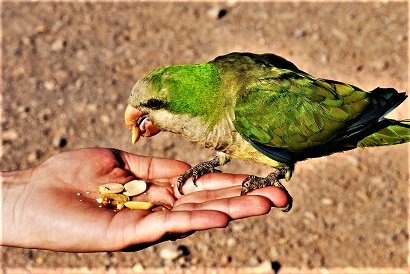In recent years, Quaker parrots have become more and more popular as pets all around the world due to their charming, energetic, and comical personalities. So, if you wish to have this exciting species as a pet and want to know what is the lifespan of a Quaker parrot and how you can increase its life expectancy? Then you have reached the right place.
Quaker parrot, also known as Monk Parakeet and Quaker Parakeet, enjoys a relatively long lifespan ranging between 20 and 30 years both in captivity and wild. Some live even longer when well taken care of.
What is the average lifespan of a Quaker parrot?
Native to South America, Quaker parrots live in large flocks and nesting communities in the wild.
They are small to medium-sized birds and can usually live from 15 to 30 years and can grow up to 11 inches. They are highly curious and intelligent species of parrots and demand plenty of attention. So, only buy a Quaker when you are ready for the commitment.
How to increase the life expectancy of Quaker Parrot?
Quaker parrots are beautiful talking birds that are widely kept as pets, and a pet is always adorable when it is healthy and active.
Quaker Parrot is an extremely intelligent species of parrot. They will keep you busy with their antics and love the attention while their exceptional talent of imitating human voice is certain to amuse everyone.
So, it goes without a doubt that you would want your bird to live a happy, healthy, and long life.
However, there is no magic pill or trick to extend the lifespan of the Quaker parrot. Proper care and a healthy lifestyle are the only and primary things that can help increase the lifespan of your little friend.
So, here are the top 10 ways to take care of your Quaker parrot and increase its life expectancy:
1. Get to Know the Quaker Parrot
First thing first, if you wish to have a Quaker and increase its lifespan, you must know its nature and other facts so that you can take fitting care. Here are some Quaker facts to know;
– Quaker parrots are not allowed to have as pets in some US states because when they escape from captivity, they become destructive and often cause crop and lawn damages.
– If Quakers are allowed in your state, you should find a reputable local breeder and see if babies are available. If so, you should try to help with hand-feeding to bond with the baby. If you cannot locate a breeder, then visit a pet store with a knowledgeable staff and try playing and talking with the bird to allow the one to choose you. It is essential in the case of Quaker parrot because if you do not feel a bond with a Quaker, then 30 years can be a long time.
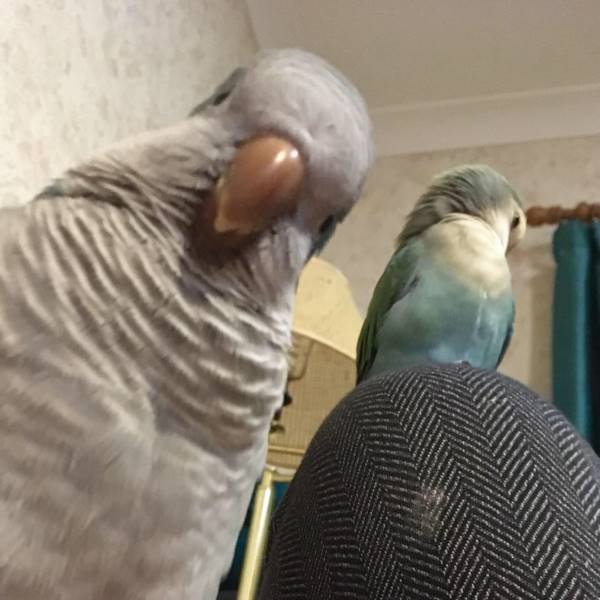
2. Provide a Balanced and Diverse Diet
Little dietary deficiencies are quite often accountable for pet birds’ dropped resistance, and birds with such deficiencies contract illnesses eventually in their later years that shorten their lifespan.
Furthermore, Quaker parrots tend to become overweight if their diet is not monitored closely like other bird species, including Amazons and Cockatoos.
Check out our affiliate store for best seed mixture:
Therefore, it is vital to provide a healthy diet. You must offer your pet a variety of fresh foods daily, including vegetables, fruits, and leafy greens, in addition to a high quality and balanced commercial seed and pellet mix along with plenty of clean water, of course.
Provision of a diverse diet is vital as a monotonous daily diet of bird food pellets both lacks the diversity to provide proper nutrition and may also source boredom, eventually leading to a lack of eating in birds like Quakers. Therefore, make the pellets part of the diet, but by mixing it with a variety of fruits and vegetables as well as occasional seeds and nuts.
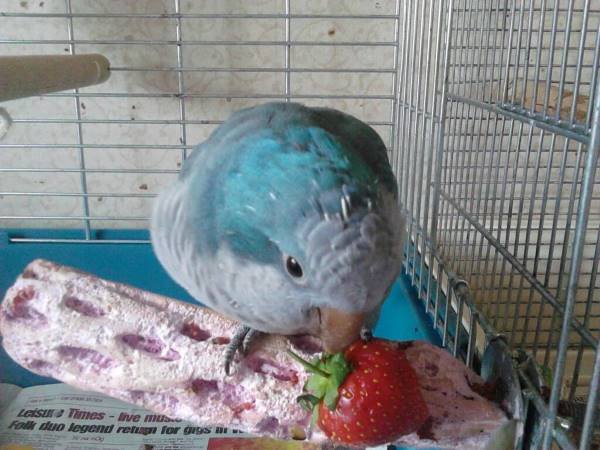
Monitor your pet closely and always make sure that your pet is not overindulging on treats like sunflower seeds, peanuts, and millet as all of these delights can cause speedy weight gain, which will obviously be damaging to their health.
3. Buy the Right Cage
Quakers belong to a smaller breed of parrot, but still, they do best with a roomy cage due to their active nature.
Therefore, your bird will need a large enclosure. The 18” x 18” x 18” is the minimum cage size for your pet. The most fitting will be 24″W x 24″D x 36″H while a flight cage is recommended due to its dynamic nature.
In addition to the nature of your pet, you must also consider safety and security features.

Quaker parrots are well-known for being escape experts, so make sure that the bars on the cage are not too far apart and not narrow enough at the same time that a curious Quaker would get its head stuck between them. ⅝-inch spacing between bars is a decent reference point and should never be more than 1/2-inch space between each bar.
Also, to neutralize their curiosity and escapability, select a gate that swings open and do not go for a guillotine-style gate that the Quaker would be able to lift only to have it become a trap.
Furthermore, Quakers are smart and have been known to figure out how to unfasten a gate, so consider a lock as well.
The placement of the cage also requires attention. Do not keep the cage where it is extremely cold or hot.
Also, take proper care of your Quaker at night because sleep is vital to your bird’s well-being.
A dark, quiet, and slightly private area is required for a Quaker to sleep in. Most may be fine without being covered at night; however, if your bird seems to like being covered at night, you must do it, especially in winters. You can also place a heating pad in extreme cold.
Also, the cage should have some perches, natural-looking tree branches for the bird’s feet, something to chew on, such as a mineral block or cuttlebone, and a sufficient play area for exercise and amusement.
4. Find a Good Vet and Get your Quaker Checked Regularly
Little, insignificant issues can result in serious health issues, endangering your pet bird’s life if not paid adequate attention.
Thus, it is vital that you take your Quaker pet for annual checks and more as needed by a veterinarian, one with a bird specialization if possible. Claw, Beak, and feather health should be areas of specific focus, as issues in these areas are frequently indicators of bigger problems.
Feather plucking is a disorder that is quite common among Quakers and can be caused by physical or behavioral problems. An excellent avian vet can help with this matter.
Furthermore, it has been seen that Quakers are more vulnerable to fatty liver disease, so don’t let your bird overeat and become overweight.
However, if you feel concerned, then talk to your vet without delay because it can be quite damaging for your Quaker’s health and follow the instructions properly.
Here are Some Signs of Good Health:
- Proper eating and drinking throughout
- Smooth feathers
- A dry and clean vent
- Vigorous and playful
- Dry eyes and nostrils
- Overall normal look
Here are Some Signs of an Unhealthy Bird that you should be careful about:
- Coughing or panting
- Soiled or fluffed feathers
- Sitting continuously on the floor
- Perching on a single foot
- Discharge in nose or eyes
- Appetite loss
- Runny stools
Quaker parrots have a predisposition to conceal any signs of disease and usually appear sick only when they are at an advanced stage of the disease. Therefore, an annual exam by an aviary veterinarian is recommended by ASPCA to conduct necessary testing and to check for any early signs of ailment.
5. Play with Your Bird
You welcome a bird into your home for companionship, but do you know that your feathered companion also craves the same.
Quakers are very fun-loving, cheerful, and active birds and are also very sensitive. Chances are their whistles, screeches, jabbering, etc. are tries at communication.
They need attention and love to play. So you better find the time, every day, to spend engaging your pet’s mind and body.
Like a little child, regular, active attention will make your Quaker happier and healthier.
If you think you will just get one, put it in a cage and play with it once in a while when you feel like it, well, let me tell you that it is not going to work. Your bird will only become bored, gloomy, and frustrated if you do this. And this sadness will only add to their short lifespan. So, if you wish to keep them healthy and live longer, then pay attention to them.

There are many games you can play with a Quaker. You can teach your Quaker to “step up,” meaning hop up on your finger when you tap it on its breast— this is actually a door to other commands, tricks, and games for the future.
You can also provide your pet with toys, and mix them up repeatedly to keep your bird engaged.
Quakers commonly destroy toys, so mix in some homemade toys, challenges, and games. For example, you can provide your bird with some mental stimulation with something as simple as balling up a treat in a scrunch of paper.
Quakers are also very talkative and usually like to talk and take to it quickly. Repeating words and phrases during playtime or even when you are doing some other work can keep them engaged and will work as an easy way to teach new words.
You should also have focused lessons of 10-15 minutes each day. However, keep in mind that Quakers are quite skilled and eager mimics, so be mindful of what they hear from you or TV.
6. Protect your Quaker
Like kids, Quaker parrots are very naughty and can be reckless sometimes. Therefore, you must take steps to protect your bird from harming itself and other pets.
Many people opt for wing-clipping, which is controversial due to many reasons. Where this practice decreases the risk of injury and makes escape less likely, it also curtails the bird’s ability to fly.
It can lead to frustration and less exercise for your bird. Besides, many try to fly but crash land and harm their brisket. These damages can be quite severe, making wing-clipping an outdated practice. Instead, you can go for adequate training like clicker training, which will help you control the bird during out of cage time.
It has also been seen that some fearless or foolish Quakers go after cats or dogs, which always results in severe injuries or worse.
So, take proper care of your bird pet if you have other pets in the house and keep Quakers separated from your other pets if necessary. Also, try not to conceal the cage with a blanket or fabric as it can even get caught in their nails and hurt them.
7. Social Interaction
We all know that you cannot give all of your time to your bird, while Quakers demand attention. Therefore, social exposure at a young age is possibly the best bet for success.
It will keep your Quaker from becoming a “one-person bird” who only relates well with you and become frustrated when you cannot give time due to other responsibilities.
At the same time, do not keep them in a room where there is too much traffic because they will need a relaxed atmosphere to rest.
8. Keep them Engaged
Remember that Quakers want to be a part of the action, so don’t insulate them in a cage put away in a low-traffic area.
Place the birdcage in the main living space like a living room and a non-remote corner of the room, So that your bird can feel energetically involved yet have a piece of territory to call its own. Also, give the bird ample daily time out of the cage.
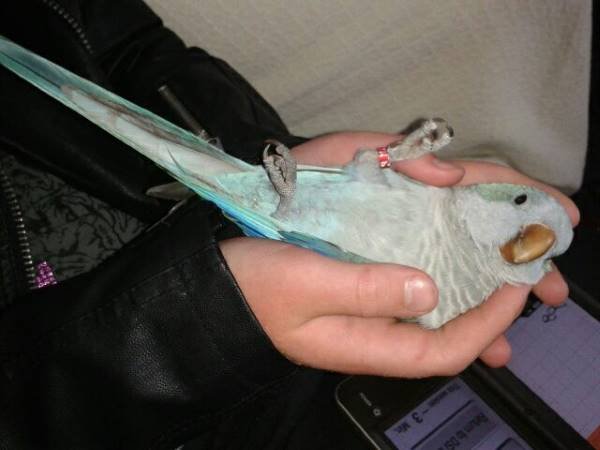
It will make your Quaker an actual part of the family.
Also, make daily interaction the norm. You can pause to give your Quaker some head scratches when you are walking by the cage or doing a workout in a gym, and also allowing some out-of-cage time hanging near you while you do your work, can go a long way to making your Quaker’s day and keep it happy.
9. Exercise is Critical for your Quaker’s health
Like humans, birds also need to get up and move each day. So, give your Quaker a daily dose of exercise. Let your pet have some flight time in a bird-proofed room and allow for some controlled floor to explore time.
You can provide long ladders to your bird as its very own Stairmaster. Get your bird to start at the bottom of the ladder, and once it reaches the top, begin at the bottom again.
Wing flapping exercises can also get your Quaker on a cardio routine. Settle the bird on the hand or a hand-held branch.
Now, drop your hand down so the bird can flap the wings to stay perched. However, do not go fast because wing-flapping requires a delicate balance. Your bird will either fly off or crash to the ground if you don’t maintain the balance. Plus, do not do too many wing-flap reps that the Quaker struggles to catch its breath.
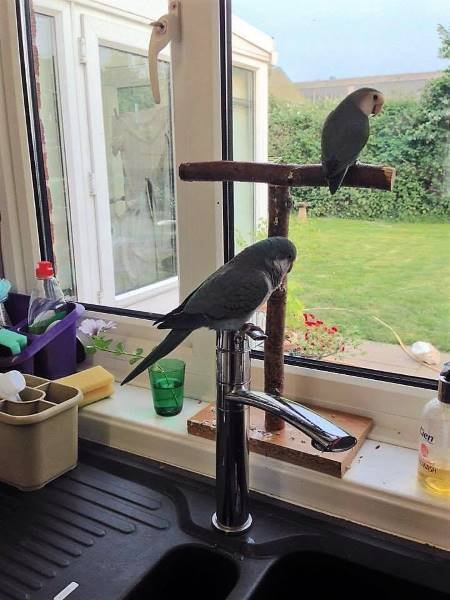
Swing perch and toys can also provide your bird inside the cage exercise opportunities. Some birds also like to hand wrestle, which can be a fun exercise. However, be mindful of “interaction overload,” or your Quaker will get overly stimulated and suddenly peck you.
10. Foods To Avoid
Quaker Parrots are good eaters. They can eat a lot of foods, but when it comes to foods that could reduce a Quaker parrot’s lifespan or could be toxic for them, you have to be careful.
When planning a diet plan for Quaker parrots, make sure to give them food that is low in fat, sugar, and salt. Too much fat can lead to fatty liver disease, and sugar also turns into fat. Salt, on the other hand, can cause circulatory, digestive, and heart problems.
Limit their fattening seeds intake and also give fruits in small portions like 1-3 times a week as they also have a high level of sugar. Some fruit seeds have a low level of Cyanide that could cause vomiting, diarrhea, seizures, paralysis, and eventually death if the poisoning deepens.
So it’s best to avoid all fruit seeds and remember that tomato is a fruit so you can give it to your Quaker but don’t give its seeds as well.
Other foods that you have to avoid in Quaker’s diet are carbonated beverages, butter, dried fruits with preservatives, onions, either raw or cooked, asparagus, eggplant, olives, chocolate, and caffeine.
Quaker Parrots are lovely, cheerful, and energetic fellows that keep you laughing with their cute antics and mischiefs.
However, like any other living organism on the planet, they require care and love to live a healthy and long life. So, give them due attention and increase the lifespan of your Quaker parrot and enjoy the beautiful companionship.
Everything you need to know about Quaker parrot –check our comprehensive guide.

